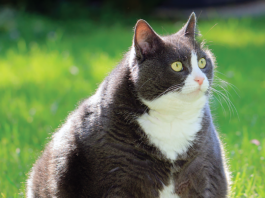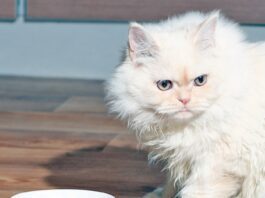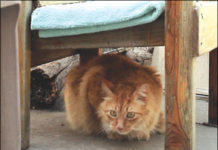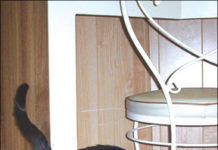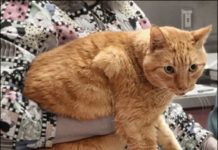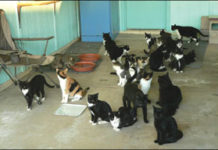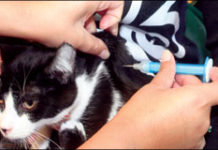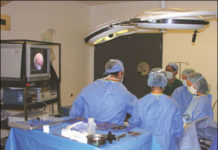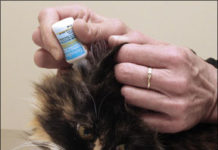Epilepsy: Always Alarming
Whether happily playing with its favorite toy, vigorously pursuing a tiny mouse, or frantically fleeing from a mean-spirited predator, all of your cats activities rely on the controlled transmission of electrical signals among the billions of nerve cells (neurons) that are jammed into its little brain. In a normal cat, the transmission - or firing - of these signals is well controlled within the central nervous system. These neurons either fire or are inhibited from firing according to an animals shifting needs and desires. In the brains of cats affected with the disorder known as epilepsy, however, this elegant process goes awry. As Alexander de Lahunta, James Law Professor Emeritus of Anatomy at the Cornell Universitys College of Veterinary Medicine, explains: "Neurons are made to fire, so until the transmission of electrical signals is needed, they are kept in a static, inhibited state. If something interferes with that inhibition, an uncontrolled firing of neurons can occur - and that is the phenomenon commonly referred to as a seizure." Dr. de Lahunta describes the "classic" seizure as follows: "The animal suddenly begins to alter its behavior. It acts warily, as if it senses that something unusual is about to happen. It gets very tense, its muscles contract, causing stiffness and trembling. It begins to chew and to drip saliva, even though there is nothing in its mouth. Then the animal becomes increasingly rigid, falls to one side with its limbs extended, and starts paddling them. "Meanwhile, the cats entire body starts shaking - and at this stage, it may stop breathing for as long as 30 or 40 seconds. And then, the panting and shaking and everything else begins to slow down - and within a few minutes, the animal seems to be normal again."
Is it Urinary Incontinence or Urine Marking?
When a cat begins soiling the house, it is usually assumed that it is a behavioral problem or the onset of senility. However, there are several medical conditions that can cause urinary incontinence and inappropriate urination, some of which require immediate treatment. First, it is important to distinguish between incontinence and inappropriate urination. True incontinence occurs when a cat does not have voluntary control over urination; trauma, a weak primary sphincter muscle and congenital abnormalities are the most common causes of incontinence. Inappropriate urination is much more common than true incontinence; this may be a behavioral problem or it may be the result of an underlying medical condition. The most common medical cause of inappropriate urination is inflammation of the urinary bladder. While the root causes often vary significantly, the signs - called lower urinary tract signs or LUTS - are similar: frequent urination, excessive licking of the genital area and difficult or painful urination. The actual diagnosis can range from a urinary tract infection to urethral blockage. It is extremely important to seek veterinary care if your cat exhibits these signs - do not assume that the animal is simply constipated. If he is suffering from urethral blockage, he may lose consciousness and die within a day or two of complete blockage. On the other hand, it may turn out to be something as treatable as a urinary tract infection. To begin with, your veterinarian may ask several questions...
Obesity: A Big Problem
Feline obesity is a problem among housecats. "As many as 30 to 40 percent of cats are overweight, with 15 to 20 percent falling in the obese range," says Joseph Wakshlag, DVM, PhD, DACVN, assistant professor of clinical nutrition at Cornell Universitys College of Veterinary Medicine. Despite public education efforts by the veterinary community, the numbers have not improved over the past decade, which is especially troubling because added weight can have serious health repercussions for cats. An overweight cat is at risk for several diseases, relates Dr. Wakshlag. "Obesity is one of the biggest factors for feline diabetes II," he says, adding that the extra weight carried by heavy cats causes stress on the felines joints, which can cause early onset of arthritis. Obese cats are also at heightened risk for feline hepatic lipidosis (FHL), or feline fatty liver syndrome, a liver disease that occurs when fat cells build up in the liver and prevent it from functioning normally. Heavy cats also may have more difficulties grooming themselves, which could cause hygiene and skin issues. Overweight cats may also be at increased risks in surgery.
Spaying: Very Important
When your purebred kitten reaches maturity, you may want to breed her, and you may already have a carefully worked-out strategy for doing so. Otherwise, there is no good reason to avoid having the little animal spayed while shes still in the early months of her life - and there are a number of good reasons for doing so. First and foremost among these reasons, says Andrea Looney, DVM, a lecturer in anesthesiology at the Cornell University Hospital for Animals, is that spaying - also called ovariohysterectomy - will help curb rampant feline overpopulation. According to the American Society for the Prevention of Cruelty to Animals, millions of feral and unwanted domestic cats are born each year. They are either abandoned or relegated to frequently overcrowded shelters and a dismal existence that is often relieved only by euthanasia. Moreover, Dr. Looney points out, spaying a female kitten at four to six months of age - when her reproductive organs are nearing maturity - will dramatically reduce her susceptibility to several life-threatening disorders associated with the feline reproductive system. For example, spaying a kitten prior to her first heat - before her breast tissue develops - will virtually eliminate her risk for mammary cancer later in life. Also, since spaying entails the removal of a females uterus, Dr. Looney notes, the procedure rules out the possibility of pyometra, a potentially fatal collection of pus in that reproductive organ. Other conditions that are prevented include vaginal hyperplasia, a gross swelling of the vaginal wall that occurs during the normal heat cycle; uterine torsion, a twisting of the uterus that may occur late in pregnancy; uterine prolapse, the bulging of the uterus into the vagina; and a variety of infections, cysts and cancers of the uterus and ovaries.
Short Takes: 02/09
Here at ShortTakes office, we are on a healthcare honeymoon with Frannie, the feline "office manager" who is barely three years old. We are saving our worries (and money) for feline old age (the last ShortTakes muse, Gertie, lived to 21) when maladies like feline lower urinary tract disease (FLUTD) are likely to strike. Just in time to start to worry comes this report in Veterinary Clinics of North America (Vol. 39 Issue 1): "Changing Paradigms of Idiopathic Feline Cystitis." Cystitis is inflammation of the urinary bladder. Idiopathic means its cause is currently unknown. However, the stressors for cystitis have been identified. The report mentions "stressful events such as earthquakes, seasonal weather changes, moves to a new home, major holidays and diet changes." That settles it, Frannie. You cant move to California during the Santa Anna winds. Or Easter-Passover holidays, either.
Short Takes: 01/09
When veterinarians ask, "How are things at home?" they probably dont want to hear about your mortgage, your migraines or Aunt Millie in the guestroom. They should be asking about "lifestyle" issues that might be affecting the health of your cat. Problem is, too few vets do, according to a report in the Journal of the American Veterinary Medical Association (JAVMA Vol. 233, No. 10) about client-veterinarian communications. The study compared verbal interactions during well-pet visits - the once-a-year checkups (or twice-yearly visits for older cats) as opposed to vet appointments when a medical problem prompted a visit. Typically, as it turns out, well-pet visits include more verbal interaction with the pets, according to the report: Wellness appointments included "twice as much verbal interaction with the pet as did problem appointments, and the emotional atmosphere of wellness appointments was generally relaxed. There were more social talk, laughter, statements of reassurance and compliments directed toward the client and the pet." In contrast, during problem visits, 90 percent of the talk focused on what the report called "biomedical topics." And that is a problem, the JAVMA report concluded, because "veterinarians may neglect lifestyle and social concerns that could impact patient management and outcomes" when focusing on biomedical issues.
Upper Respiratory Disease
Indications that your cat is experiencing a viral infection of its upper respiratory tract - which includes its nose, sinuses, pharynx and larynx - are similar to those that trouble you when you catch a cold: watery eyes, runny nose, wheezing, sneezing and coughing. Just as you are likely to be completely and permanently rid of your cold within a week or so, a cat, in most instances, will also get over the clinical signs of disease within a few days. In some cases, however, serious complications can occur. About 80 percent of feline upper respiratory infections are caused by either of two viruses: feline herpesvirus (FHV), also known as feline rhinotracheitis virus (FRV); and feline calicivirus (FCV). A third and far less frequent cause of upper respiratory infections in cats is Chlamydophilia felis, a bacterial agent. "All three of these organisms are very specific to cats," says Dr. Richard Goldstein, an associate professor of small animal medicine at Cornell Universitys College of Veterinary Medicine. None of these disease agents, he notes, is transmissible to humans or dogs.
Neurological Disorders
Although its only the size of a golf ball, your cats brain is just about as complex and, when it comes to matters of vital concern, just about as capable as your brain. Of course, a cat uses its brain and the other components of its neurologic system to address needs and desires that are often different from yours. After all, you like to read books and watch movies; your cat likes to torment mice and play with balls of yarn. Sad to say, a cats neurologic system also resembles yours in the wide variety of serious disorders with which it can be afflicted, sometimes with fatal consequences. According to Curtis Dewey, DVM, an associate professor of neurology and neurosurgery at the Cornell University College of Veterinary Medicine, he and his colleagues typically treat four or five neurologically compromised cats each week at the universitys animal hospital.
Ask Elizabeth: 01/09
Dear Elizabeth: Help! I am pregnant and really need some answers about Toxoplasmosis. I know (from reading CatWatch!) that people can be infected by eggs in a cats feces. I also understand that Toxoplasmosis is really dangerous during pregnancy, so I had my cat tested last week.
Help for the Matted Cat
While it may seem unlikely to you (given the reputation cats have for personal hygiene and grooming habits), a trip to the groomers can sometimes become necessary for a badly matted cat. There are several factors which can contribute to the matting of a cats haircoat, two ways to deal with it - and one simple way to avoid it in the future. Jana West, owner and operator of Shampooch, located in Savona, NY, has been grooming cats and dogs for eight years. West relates that the most common places for a cat to develop mats are on the back - near the tail, under the belly, along the hind legs and under the tail. She explains that there are three types of cats that [IMGCAP(1)]are more prone to developing mats in their haircoat: "The majority of the cats that have a problem are older cats, bigger cats or cats allowed to spend time outdoors." As cats age, grooming may become less important to them. In addition, cats with a weight issue may have more difficulty reaching certain areas of their bodies. And when it comes to outdoor cats, West adds, "Ideally, all cats would be kept inside and wouldnt come in contact with burrs and branches, but thats not always realistic."
Laparascopic Surgery
Your normally active cat isnt eating well, and shes suffering from intermittent vomiting and diarrhea. You make an appointment at the veterinary clinic and during the exam, your veterinarian recommends a liver biopsy to determine exactly whats going on. Sounds simple enough, but taking a biopsy requires that your cat be placed under general anesthesia and her abdomen cut open so the veterinarian can take a small sample of the liver. Afterward, the wound is sutured and your cat must remain in the hospital for a day or two for observation, all the while receiving medication to alleviate her post-operative pain. In the past, this was the typical scenario for all exploratory surgeries in the abdominal region of a cats body. Today, with advances in veterinary medicine, veterinarians have access to a revolutionary surgical technique called laparoscopy - a minimally invasive medical procedure that is being used with increasing frequency for a variety of diagnostic and surgical purposes. The technology is a giant step forward for the veterinary surgical field, according to James Flanders, DVM, an associate professor of surgery at Cornell Universitys College of Veterinary Medicine. "Traditionally, veterinarians would perform an open surgery, where we make a large, mid-line incision in the abdomen in order to look inside and do whatever we need to do, whether its to take a biopsy of the liver or to remove bladder stones. Now, with the laparoscope, we only need to a few small incisions (each one about a half-inch in length). Because the incisions are so tiny, the animal experiences far less post-operative pain and recovers faster."
Feline Ear Disorders
Among a normal, healthy, and properly cared-for cats many distinctive attributes is its astoundingly acute sense of hearing. While the human auditory system is capable of detecting sounds ranging in frequency up to about 20,000 vibrations per second, cats typically can sense sounds pulsating at 60,000 vibrations per second or greater. This impressive acoustic sensitivity has been honed over the ages to serve a cat in countless ways - signaling the stealthy approach of a dangerous predator, for example, or detecting the underground movement of a burrowing rodent. Although most cats will go through life without experiencing a serious problem with their ears, owners should know that a variety of conditions - including congenital defects, infections, trauma and age-related changes - can be extremely painful and may compromise an animals hearing. Most feline ear disorders are readily treatable and will not result in permanent hearing loss, notes James Flanders, DVM, an associate professor of surgery at Cornell Universitys College of Veterinary Medicine. However, some conditions may render a cat partially or totally deaf, especially if they remain unrecognized and untreated.


